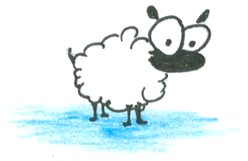Her mother regularly told her daughter she loved her. The words were not warm and brimming with sentiment, but rather cold and austere, as much of her mother’s communication tended to be. In the phrase, too, lay a hint of anger and defensiveness, as in I’m not like those crappy parents who never tell their children they are loved, or try to accuse me now that your childhood is bad when I have said, on record, that I love you, every day for the last ten years.
Her father, too, emphatically expressed his love for his children at the end of every conversation, stated both as a fact and a departing signature, substituting for ‘be good to your mother,’ which was awkward, or ‘see ya later, alligator,’ which the children had quickly outgrown. She understood her fathers actions better because, as an irregular parental figure, he may be days or weeks out of their lives, and she felt he sincerely wanted to leave his children with a concrete assurance of his feelings for them, lest they doubt it in his absence.
The frequency of “I love you”s was so pronounced in both parents that she eventually grew to suspect that they had conversed on the subject at least once, during that unknowable time period when they had been a couple and assumedly had conversations. Like most parenting decisions made at the time, she suspected it was a reaction to something that had occurred in one or both of their childhoods, or, at the very least, in the childhood of someone they both knew or a fictional character whose childhood was used as a parable in the church they attended, whereby both mother and father to-be learned the terrible damage that could be wrought by not telling your child, often enough, that they were loved.
They had decided or been taught that the best way to convey their unconditional love was to repeat the phrase “I love you,” eagerly, regularly, at socially acceptable intervals, such as when the child is departing for school, or at the end of a phone conversation, and she suspected that the habit of this action had eventually overshadowed the underlying intention of the act, leaving her mother’s disregard for conveying love or ensuring the feeling of love in her children, and left only the oft repeated phrase.
Like most of the values that her parents fervently persisted in, she suspected this stemmed from a cultural fad that had existed in the mid to late seventies, or general movement of social consciousness which had developed at that time and since evolved considerably so as to be unrecognizable in its present form. Like being a born-again Christian**, and the Muppet Show.
As in all things parental, the line between love, resentment, and socially-accepted obligation was blurry at best.
The mother cares for her children because she loves them. The mother cares for her children because she’s legally obligated to do so and would be judged by others if she does not. The mother cares for her children because she expects said children to acknowledge her care as a sacrifice made due to love and to never imply that such sacrifice is due to legal obligation or societal pressure, lest they be screamed at in high pitched tones, which they are to understand stems from an intense abundance of love, but also hurt and anger and dislike, because all such emotions freely coexist, as in “I love you, but I don’t like you,” a phrase which was frequently heard in her early childhood.
The daughter views “like” as the lesser version of “love,” thus negating her mothers views on the subject entirely. The daughter grows defensive of this connectedness, holding it central to her world view, becoming incensed and eventually tearful if anyone argues that the terms are not directly linked. She takes care to assure her loved ones, specifically her two dogs and sister, and her mother to a much lesser degree, that she both likes them and loves them, and she does so at intervals which are not predetermined and thus vary in frequency but still often include the ends of phone calls and times of departure.
**Christian, in this case, meaning ‘evangelical,’ just like Jimmy Carter’s sister who, if I remember it correctly, was reported as going around and performing freelance exorcisms. The fact that members of this evangelical branch of protestantism refer to themselves just “Christians,” as though there were only one real kind, is usually enough to characterize them, at least as far as I was concerned.
David Foster Wallace’s The Pale King
posthumously published audiobook* version
(*so the spelling and/or punctuation is my own and therefore may be wonky)





1 comment:
What was the bet?
Post a Comment